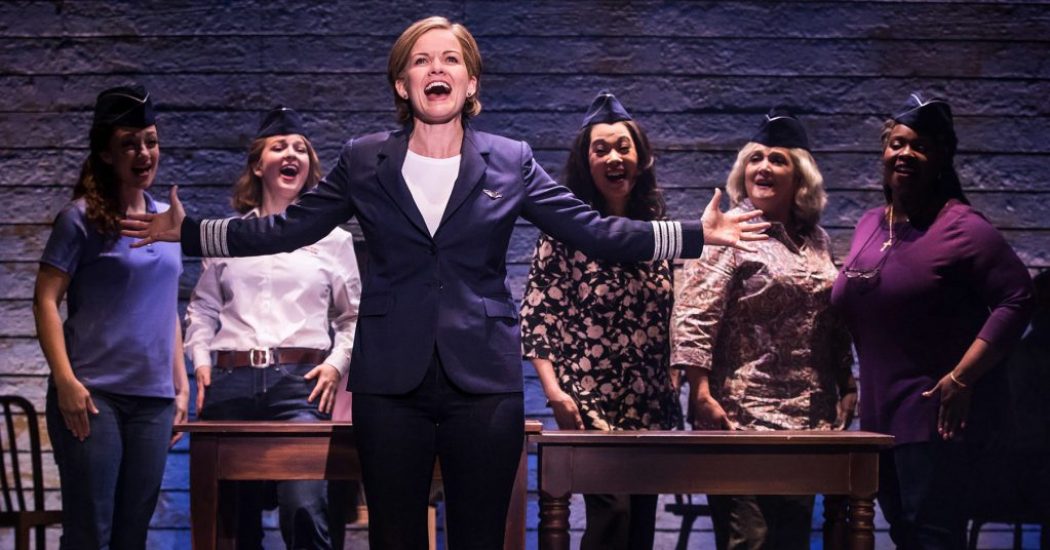‘Come From Away’ Cast Members Meet the People Who Inspired Their Roles
The heartwarming hit Broadway musical “Come From Away,” playing through Sunday at the Fox Theatre details how the townspeople of the tiny island town of Gander, Newfoundland responded on September 11, 2001 when more than 7,000 strangers were rerouted to their modest airport after U.S. air space unexpectedly closed following the terror attacks in New York, Virginia and Pennsylvania.
“Come From Away” creators David Hein and Irene Sankoff spent a month in Gander talking to the towns people who took in complete strangers, clothed and fed them for five days until the stranded travelers could return safely home. Hein and Sankoff also interviewed passengers, flight crews and pilots and ended up packing the stories of 16,000 people into the uplifting 100-minute show.
Following Tuesday night’s opening performance of “Come From Away” at the Fox, audience members were treated to a once-in-a-lifetime event when the real-life Beverley Bass, the first female American Airlines Captain, Air France passenger Kevin Tuerff and Claude Elliott, the now-retired mayor of Gander appeared on stage for a panel discussion together, along with the cast members who play them each night in the show.
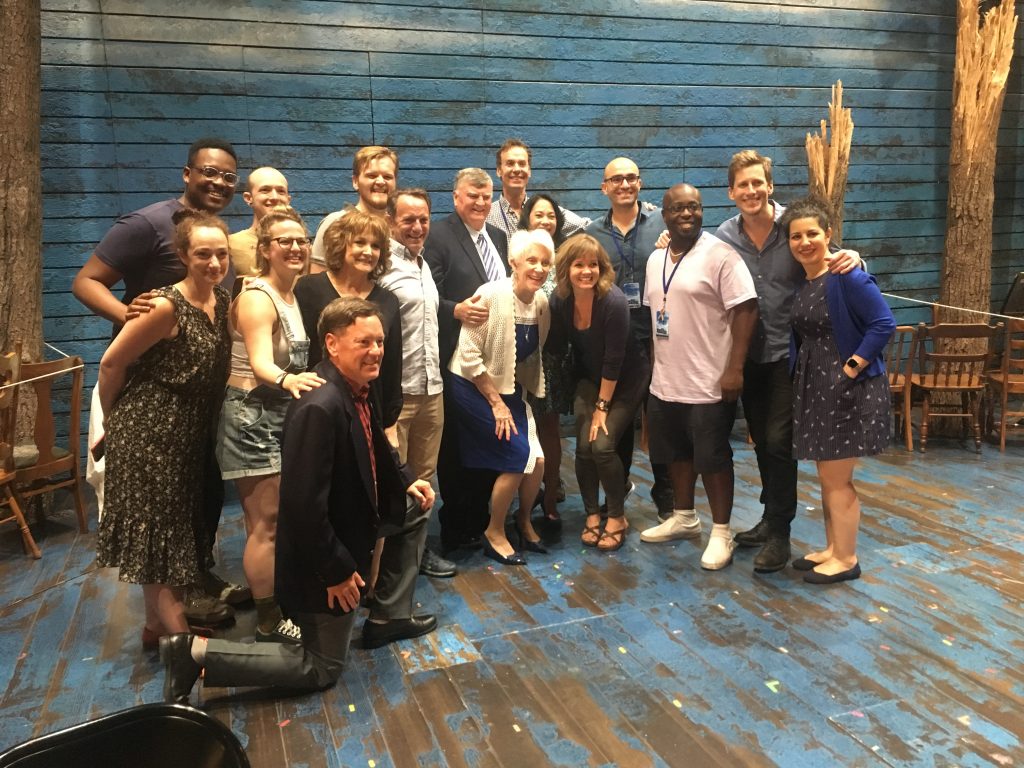
Tuerff, one half of the show’s gay couple, who served as the moderator for the conversation, has written a memoir about his experiences, “Channel of Peace: Stranded in Gander on 9/11.” Bass, now retired from American Airlines, has a new childrens book based on her life coming out via Random House on Sept. 10. It’s titled “Me and the Sky,” after Beverley’s Act Two song in the show (performed by Becky Gulsvig in musical). Elliott, meanwhile, was seated a few feet from Kevin Carolan, who plays Gander’s mayor in the musical while Tueff’s doppelganger, actor Andrew Samonsky also emerged to experience the conversation with his real-life counterpart.
The following is an edited version of the very special 30-minute conversation.
Kevin Tuerff: I just want to say, there are some things that are exaggerated in the show. For example, in the show, I’m portrayed as a gay lumberjack. I am not a lumberjack (audience laughs). There are a lot of stories that aren’t in the show and that’s the reason I wrote “Channel of Peace: Stranded in Gander on 9/11.” This show started four years ago in San Diego and audiences react the same way every night — people leapt to their feet and they continue to do it every single time. This show is about a bright spot on a terrible day. Mr. Mayor, what makes the population of Gander, Newfoundland and its people so unique?
Claude Elliott: One of the biggest reasons was there were 7,000 stranded people and we had 500 hotel rooms (audience laughs). We had a challenge with hotel rooms but it wasn’t a challenge for our community because the strongest asset any community can have is its people. If you have good people, anything can happen. Before we ever asked for anything, our people appeared and donated food. At first, we were told not to take anyone into our homes because we didn’t know how wide spread the terror attacks were. It just reflected our unique way of life. We live on an island. We’ve had severe weather and hardships that span the generations but we always come together. If doesn’t matter who you are or where you’re from, if you need help, we’re going to be there to help you. That generosity is instilled in our young generation there today. You have to be kind to people, you need to love people and you have to show compassion.
Kevin Tuerff: Captain Bass, you were flying that day. What was the first message you recall hearing on your radio?
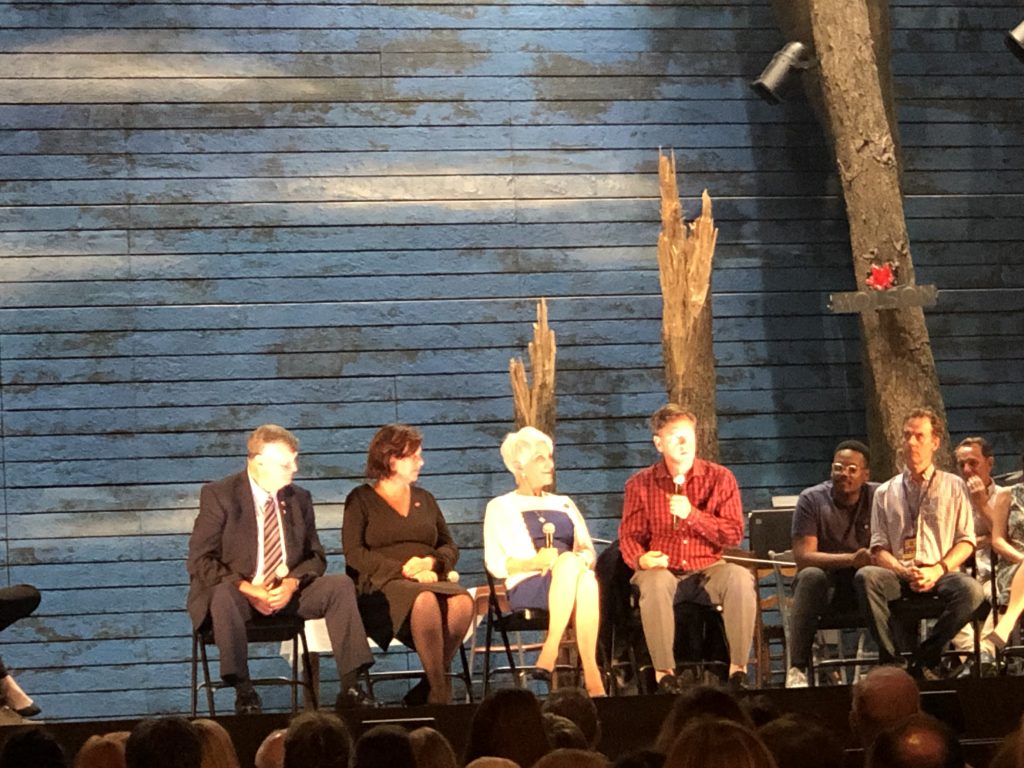
Beverley Bass: I had left Paris to fly to Dallas. It’s usually a 10-hour flight. When we first heard about it on our aircraft radios, we were right over the North Atlantic. One of the first things we heard was one of the towers had been hit. We thought it was perhaps a light aircraft. I don’t think any of us in any of our minds thought it was an airliner. Then, about 20 minutes later, we heard about the second plane. I was so naïve, I thought terrorism was something that happened elsewhere, not on U.S. soil. I couldn’t even imagine what had happened. We didn’t know any details. We didn’t know the airplanes had been hijacked, we didn’t know any of that. Then we heard New York’s airspace was closed, and then, all of U.S. airspace was closed. We knew we would divert somewhere in Canada. I assumed it would be Toronto or Montreal, you know, one of the larger cities. It never crossed my mind it would be Gander.
Kevin Tuerff: My Air France flight was behind you and I believe I actually have video of your plane landing.
Beverley Bass: I’d like to see that! (audience laughs).
Kevin Tuerff: What did you tell your passengers?
Beverley Bass: That was one of the hardest PAs I ever had to make because it’s the flight attendants who have to deal with the passengers. I’m locked behind a steel door. I had to be careful about what I was going to say. I had made up my mind that I was going to tell the truth, but not too much of it. I didn’t know very much at that time but I knew I wasn’t going to make up a mechanical problem. I didn’t want to get on the ground and have to undo that story. So, I said, “Ladies and gentleman, this is Captain Bass. There’s been a crisis in the United States. All of the air space is closed. We’ll be landing in Gander, Newfoundland and I will get back with you with more information when we receive it.” I ran it by my lead flight attendant before I ever said anything because I wanted to make sure the flight attendants were comfortable with it. (cheers and applause from the audience). They were, so we proceeded.
Kevin Tuerff: On my Air France flight, at first, in French they used the word terrorism. I didn’t know what that was. Then in English, they told us there had been a terrorist attack in the United States and we had to land in Gander. Beverley was one of the people I interviewed for my book and you told me this beautiful story about when you reassembled to leave Gander. Can you tell that story?
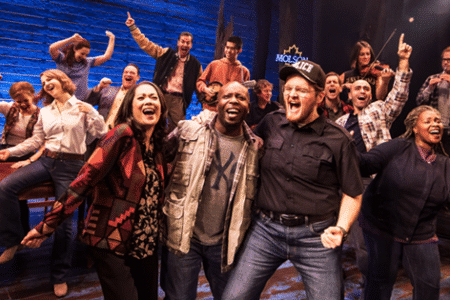
Beverley Bass: It was Sept. 14 and we were all dressed in our flight uniforms at the airport. They could only process one airplane at a time. Everyone was pretty excited because we were going home. Then we found out they had canceled our flight because they couldn’t locate all of our passengers. In order to leave, you had to depart with the exact number of passengers and all the names had to match on the manifest that you came in on. So our departure was canceled and we were waiting inside the airport and two older ladies walked up to us and they didn’t say anything. One of them was carrying a duffel bag and she pulled out an accordion and starts playing … I’m going to see if I can say this… (Tuerff takes her hand) “God Bless America” on her accordion.
Kevin Tuerff: A lot of people ask us what it’s like having someone play you in the show. Where is Andrew [Samonsky]? Basically, he’s the younger, better looking, single version of me. (audience laughs). What’s it like to have a doppelganger? It’s pretty surreal. There are now five productions of the show running and the musical opens next month in Melbourne, Australia. One of the most remarkable experiences we’ve had was going back to Gander to see them put on the show for the people there. Claude, can you tell us what that was like from your perspective?
Claude Elliott: It was certainly unique. Our people had definitely heard about it and wanted to see it. But you have to keep in mind, we only have an arts and cultural center that holds 400 people. (audience laughs). The only other place we could hold it was at the hockey rink. Near the end of the show, people stood up and started applauding and they didn’t stop. The cast got very emotional. The cast was overwhelmed but they managed to get through the remaining scenes. It was also emotional for us because what we saw in the United States on that day in 2001 was the worst of mankind but what 7,000 of us saw in Gander that day was the best of mankind.
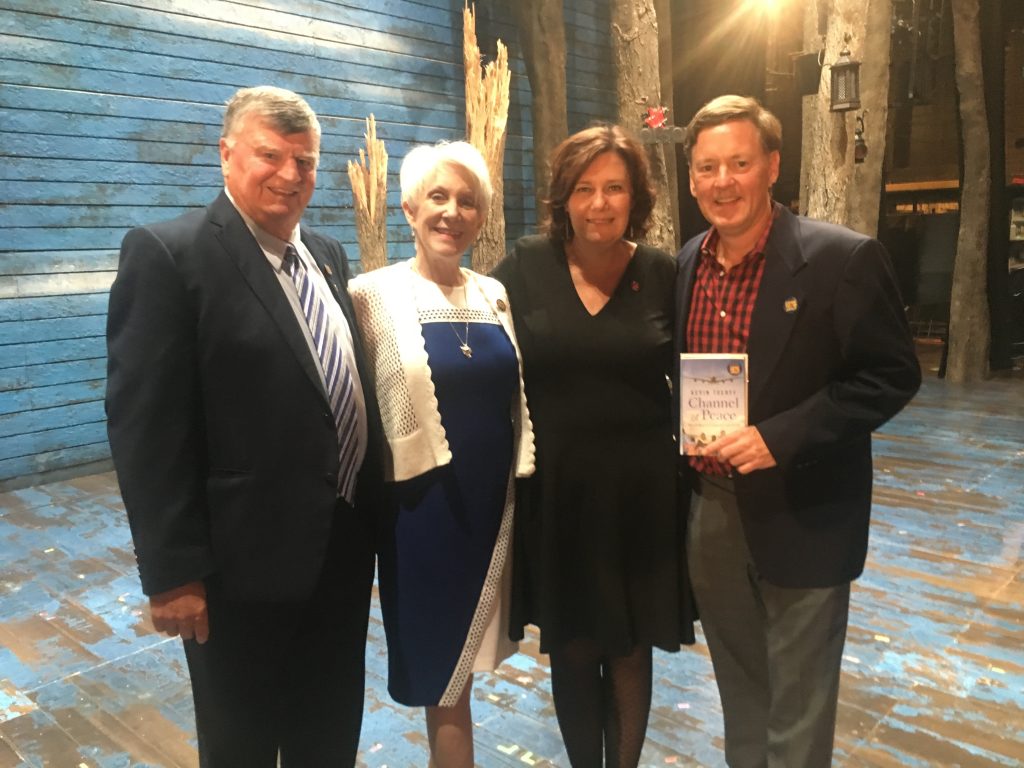
Beverley Bass: It was very interesting seeing the show in Newfoundland because they laugh at different things. One of my favorite scenes in the show is when Claude’s character tells Bob to just take peoples’ barbecue grills out of their backyards. During that scene, people in Newfoundland did not laugh. I asked Claude, “Do people really just take each other’s barbeque grills here?” and he assured me they did. I told him, “Oh, in Texas we wouldn’t do that.” (audience laughs).
Claude Elliott: It’s just a different way of life. Most of the time, we don’t lock our doors and we leave our keys in our cars overnight. I was doing an interview with a Detroit radio station and the fellow asked, “We understand, Mr. Mayor, that you let complete strangers use your cars?’ and I said, “Yes.” He told me, “Wow, we don’t do that here.” And I said, “Well, we don’t live in Detroit!” He said, “Aren’t you scared, they’re going to steal your vehicle?” I said, “Not really. We live on a highland.”
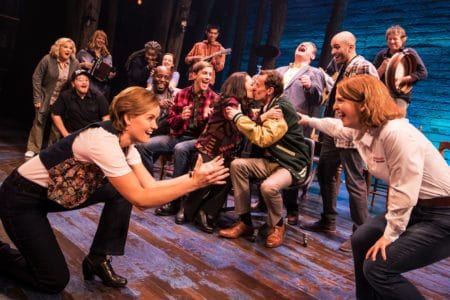
Kevin Tuerff: At one point during our stay, Kevin and I decided to walk to the Walmart. We got about 50 feet and all of a sudden a car pulls up and the guy rolls down his window. We thought we were in trouble. He asked where we were going and we told him we were walking to the Walmart. And he said, “Well, hop in!” I mean, I grew up learning about stranger danger. I didn’t get into cars with strangers. We waved him off and then a second car pulls up and then a third. Finally, Kevin said, “We might as well get in. Otherwise, we’ll never get there.” These are the things I continue to think about. When I got back to Texas, I thought, would we do the same thing here for complete strangers? Would you do that here in Atlanta? Would you let a stranger take a shower in your home or pull over and offer them a ride? What I’ve learned is the difference between empathy and compassion. Empathy on Sept 11, would have been the people of Gander sending thoughts and prayers and maybe some pizzas out to the plane. Compassion is when you engage in the suffering of others and that’s what the people there did. They gave us food, they opened up their homes to us.
“Come From Away” plays at Atlanta’s Fox Theatre through Sunday, June 30. For tickets, go to foxtheatre.org or atlanta.broadway.com.

Richard L. Eldredge is the founder and editor in chief of Eldredge ATL. As a reporter for the Atlanta Journal-Constitution and Atlanta magazine, he has covered Atlanta since 1990.

